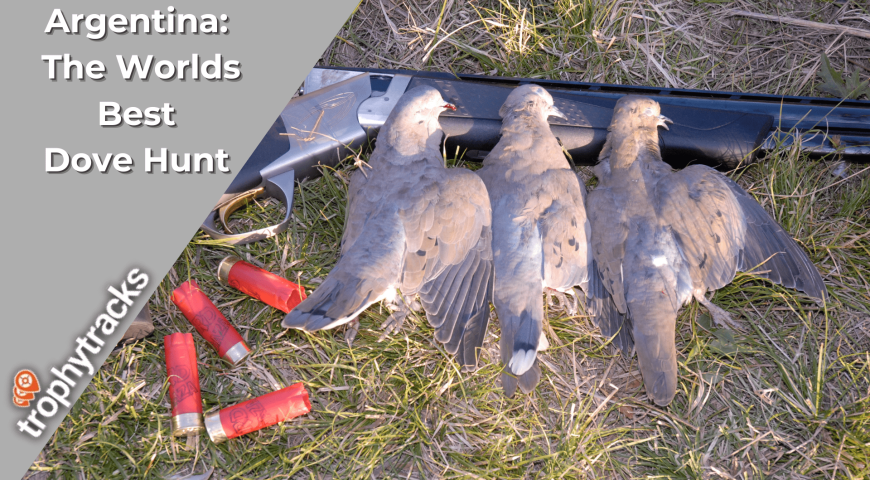
Why Argentina is the World’s Best Destination for Dove Hunting
When it comes to the world of wing shooting, specifically dove hunting, Argentina stands unrivaled as one of, if not the premier destination for dove hunting
Why is this, you ask? Well, the country’s rolling landscapes teeming with millions of eared doves provide some of the best year-round hunting opportunities that sportsmen from around the globe love.
This abundance of hunting interest in the country not only supports a thriving tourism industry that feeds the Argentine economy but also plays an absolutely crucial role in agricultural pest control, highlighting the multifaceted significance of dove hunting in Argentina that so often is overlooked.
The History of Dove Hunting in Argentina
The best way to understand why something is so popular today is to dive into the history of how it came to be. In this case, we need to look back to when farmers really started having issues with dove.
Origins and Evolution of Dove Hunting
As we mentioned, Argentina dove hunts have some deep roots, originating over three decades ago as a pragmatic and hopeful response to agricultural challenges presented by these pests.
The expansion of large-scale crop farming created the perfect environment rich in food sources, inadvertently fostering an unsustainable surge in dove populations.
Farmers, facing significant crop losses due to these burgeoning numbers, initially resorted to methods like poisoning to mitigate the growing damages and losses. However, measures like poisoning have their own issues, as they often lead to unintended ecological consequences such as harming other wildlife and contaminating the environment.
With farmers starting to recognize their need for a more sustainable solution, hunting emerged as a front-runner as an effective means to control dove populations, while simultaneously providing economic benefits through tourism.
Doves as a Plague for Farmers
To get a little more specific, the eared dove (Zenaida auriculata) is the main culprit, particularly notorious for their rapid reproduction, they breed up to four times a year with clutches of two to three eggs.
This prolific breeding along with the birds’ non-migratory nature leads to staggering population growth in a very short period of time.
In regions like Córdoba, estimates suggest there are somewhere in the realm of up to 23 million eared doves. These massive populations spell disaster for farmers in the region, with farmers experiencing losses to doves being upwards of 30% of their annual crops, including wheat, corn, and sunflower.
Consequently, hunting serves a dual purpose, the first being the obvious aid in reducing the pest population, but also bolstering Argentina’s economy through hunting tourism.
Why Argentina is the Ultimate Dove Hunting Destination
Now that you understand more of the history behind how Argentina became a dove hunters’ paradise, we can get into what other factors contribute to the world’s best dove-hunting destination.
Unique Hunting Environment
Anyone who has hunted in Argentina, whether it be for doves, red stag, or goats, will mention, at some point, Argentina’s breathtaking beauty.
That is because Argentina’s diverse geography and favorable climate are some of the most beautiful in the world, and also happen to create ideal habitats for doves. The agricultural expanses, particularly in provinces like Córdoba, offer a variety and abundance of food and roosting sites, all things needed to support massive dove populations.
Unlike other regions and species, these particular birds do not migrate, which guarantees consistent hunting opportunities all throughout the year. The country’s well-developed rural infrastructure is another plus, as it enhances the hunting experience, with numerous lodges and outfitters providing custom services to international hunters.
Government Policies and Regulations
The Argentine government recognizes the significance of dove hunting, both as a tool for pest control and as a contributor to the tourism sector. As such, hunting policies are designed to promote this activity while ensuring ecological balance.
Doves are classified as pests, leading to relaxed hunting regulations with no established bag limits, allowing hunters to take substantial numbers. This approach not only aids farmers but also attracts hunters seeking high-volume shooting experiences.
Economic and Cultural Benefits of Dove Hunting
Whereas Argentina makes for a perfect dove hunting location, the dove hunting industry does also bring some value to Argentina in return.
Economic Benefits to Farmers and Communities
International hunting tourism injects a significant volume of revenue into Argentina’s rural economies.
In Córdoba alone, the province receives an estimated average of 10,000 dove hunting tourists per year, with two-thirds hailing from the United States.
These visitors contribute to the local economy in several ways, a couple being local businesses, lodges, restaurants, and transportation services. Now, for farmers, hunting provides much-needed financial relief by mitigating crop losses and offering supplementary income through partnerships with hunting outfitters.
Cultural Significance
Beyond just monetary benefits, hunting holds a cherished place in rural Argentine culture, with countless traditions passed down through families and generations.
Dove hunting, in particular, has evolved into a social activity that fosters and maintains community bonds, all while preserving cultural heritage. Festivals and local events often center around hunting seasons, reflecting its integral role in the societal fabric of rural Argentina.
Sustainability and Conservation Efforts
With any hunting destination, there are always concerns when it comes to environmental impact and conservation.
Balancing Dove Hunting with Environmental Concerns
While dove hunting addresses immediate agricultural issues, there are concerns about sustainable practices and how they are essential to maintaining ecological balance.
Outfitters and farmers often collaborate to implement responsible hunting strategies, such as rotating hunting areas to prevent overexploitation and allow time for ecosystem regeneration. A lot of lodges have also moved away from led shot to avoid any impact that might have on the ecosystem.
Conservation programs also focus on habitat preservation and monitoring dove populations to make sure that hunting remains a viable and environmentally sound practice in Argentina.
The Hunter’s Experience in Argentina
If you’re a hunter considering taking a trip to Argentina for the dove hunt of a lifetime, there are a couple of things you can expect before even leaving home.
What to Expect from a Dove Hunting Trip
In Argentina, a typical dove hunting excursion is meticulously organized to provide a seamless and exciting experience. Depending on the lodge or outfitter you use, hunters can look forward to luxurious accommodations, often in picturesque rural settings, with amenities that cater to comfort and relaxation.
Expert guides, well-versed in local geography and dove behaviors, can offer successful hunts almost every time out by positioning hunters in the best possible locations at the perfect times. The guides will also be well equipped with any dove hunting tips that might aid hunters for hunts in that particular area.
For most operations, the quality of equipment is also top-notch, with options to rent or bring personal firearms. Testimonials from international hunters frequently highlight the exceptional hospitality or Argentinians, the thrill of unbelievable high-volume shooting, and the breathtaking landscapes that always lie in the background of each and every Argentine dove-hunting adventure.
Closing Thoughts
Argentina’s unmatched combination of abundant dove populations, favorable hunting policies/laws, and rich cultural heritage solidify its status as the world’s premier dove hunting destination.
As we mentioned earlier, the practice offers dual benefits: it supports farmers by controlling pest populations and stimulates the local economy through tourism. For hunting enthusiasts seeking an extraordinary experience, Argentina presents an opportunity to engage in a tradition that is both thrilling and deeply rooted in the country’s history and culture.

